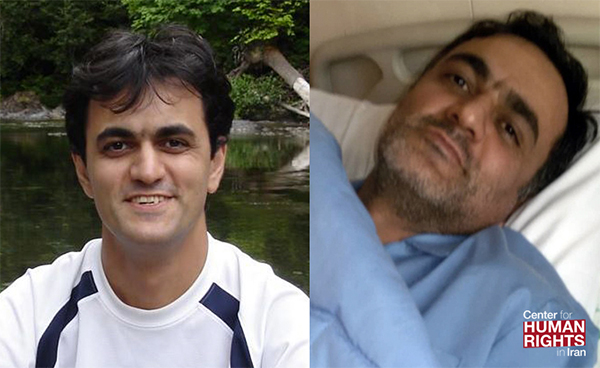
Imprisoned in Iran’s Evin Prison since 2008, Canadian permanent resident Saeed Malekpour was hospitalized for a “heart attack” at the age of 43, according to his sister.
October 26, 2018 – A Canadian resident imprisoned in Iran for the last 10 years should be released on medical grounds given his deteriorating health status, the Center for Human Rights in Iran (CHRI) said in a statement today.
“Saeed Malekpour has already spent the prime of his life in an Iranian prison where he has developed serious medical issues,” said CHRI’s Executive Director Hadi Ghaemi.
“This peaceful, young man should be immediately released so that his medical problems can be addressed,” said Ghaemi.
Malekpour was rushed to Taleghani Hospital in Tehran during the evening of October 19, 2018, from Iran’s Evin Prison after experiencing what his sister told CHRI was “later diagnosed by hospital staff as a heart attack.”
“When Saeed got back to the prison, he called me and said that during the four days he spent in the hospital, he had been chained to his bed by his wrist and ankle and couldn’t sleep well,” said Maryam Malekpour during a phone interview from her home in Canada on October 25, 2018.
“The prison guards who accompanied Saeed were so hostile to him that the other patient in the room complained,” she added. “They wouldn’t stop harassing him—even in the hospital.”
Maryam added that her brother has suffered kidney stones, prostate issues and arthritis during the decade he has spent in Evin Prison.
“My only wish is that they let him go free,” she said. “Ten years of suffering is enough for him and his family.”
Maryam Malekpour added that she was greatly distressed after seeing a photo of her hospitalized brother on social media.
“Saeed was not allowed to have visits but many of his friends and relatives went to the hospital and saw him from behind the window,” she told CHRI. “This photo was probably taken by one of his friends.”
“I haven’t seen Saeed for many years and the photo really upset me. I don’t know what to do. I feel awful and helpless,” she said.
Repeatedly Denied Furlough
Maryam Malekpour also told CHRI that judicial authorities have never allowed her brother to go on furlough, despite the fact that this is standard procedure in Iran.
“In the late winter of [2018], the prosecutor met with the prisoners and told Saeed personally that he would grant him five days of furlough,” she said.
“But in the end, they said the prosecutor was opposed to granting furlough,” she added. “In effect, they played with us.”
Furlough, temporary leave typically granted to prisoners in Iran for a variety of familial, holiday and medical reasons, is routinely denied to political prisoners as a form of additional punishment.
Saeed Malekpour, 43, was a computer programmer and web developer living as a permanent resident in Canada before he was arrested by agents of Iran’s Islamic Revolutionary Guard Corps (IRGC) during a visit to Iran in 2008 and charged with “insulting the sacred” for allegedly creating an online pornographic network.
In September 2010, a Revolutionary Court sentenced him to death in a trial egregiously lacking in due process. The sentence was commuted from death to life imprisonment in August 2013.
In a March 2010 letter, Saeed Malekpour said his confession, which was later televised, was given under physical and psychological torture. Iran has a well-documented history of forcing so-called “confessions”from detainees.
Iran’s State Prisons Organization and the judiciary are responsible for ensuring the safety and well-being of all detainees held in state custody.
The State Prison Procedures state in Article 120 that “The head of the prison’s infirmary is required to … [ensure] that they receive adequate care from doctors and nurses, [and] he must supervise the patients’ proper diet and recovery completely and continually.”
According to the UN’s Standard Minimum Rules for the Treatment of Prisoners, which all UN Member States are expected to abide by, “…Sick prisoners who require specialist treatment shall be transferred to specialized institutions or to civil hospitals.”
Yet CHRI and the UN have documented multiple cases wherein the Iranian authorities’ denial of proper medical care and recovery time to prisoners held under politically motivated charges have resulted in irreparable harm, including death.
The case of former political prisoner Alireza Rajaei, who lost part of his face in August 2017 due to sinus cancer that was left untreated in Evin Prison, put the spotlight on the ongoing denial of medical care to political prisoners in Iran.
Three months later, in October 2017, labor activist Mohammad Jarrahi died from thyroid cancer that was left untreated while he was held as a political prisoner in Tabriz Prison. Fellow labor activist Shahrokh Zamani had also died of a heart attack in September 2015 after being denied medical care in Rajaee Shahr Prison.
Political prisoner Omid Kokabee was diagnosed with advanced kidney cancer in 2016 after years of repeatedly being denied treatment for his symptoms in Evin Prison.
“It is the responsibility of Iran’s State Prisons Organization and the judiciary to safeguard the well-being of all detainees in Iran yet they have repeatedly failed on this front,” said Ghaemi.
“Instead of standing by while Saeed Malekpour’s life slips away, Iran’s judiciary should free him so that he can obtain the medical care Iran’s own laws mandate,” he said.
For interviews, contact:
Hadi Ghaemi
+1-917-669-5996
hadighaemi@iranhumanrights.org
Visit our website: www.iranhumanrights.org
